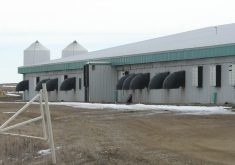The Manitoba Pork Council is pushing back against what it says is an explosive increase in the cost of on-farm deadstock pickup, and it is taking the fight to the Competition Bureau of Canada.
The organization has lodged an official complaint after what it says is a tenfold jump in the cost of an on-farm visit by grease recycling and biowaste company Rothsay. Fees jumped from $15 to $150 as of Nov. 30, 2020, the council said. In comparison, it claims, regions like Ontario have seen much lower increases.
“I would note that in Ontario, where it also operates, where there’s a little bit more competition, the fee has increased significantly, but it’s only increased to $50 per farm pickup,” Manitoba Pork Council general manager Cam Dahl said. “There is a significant disparity in the fees being charged between Manitoba and Ontario and that’s something that is cause for concern for producers here.”
Read Also

Mazergroup’s Bob Mazer dies
Mazergroup’s Bob Mazer, who helped grow his family’s company into a string of farm equipment dealerships and the main dealer for New Holland machinery in Saskatchewan and Manitoba, died July 6 from cancer.
The Manitoba Pork Council argues that, while producers can technically deal with mortalities on farm, the realities of cost and disease prevention give little practical option besides a now much higher pickup fee.
Extra cost to producers due to the fee changes will depend on the operation, he added.
Dahl also said most hog farms in Manitoba likely draw on service from Rothsay.
“Many of our members do not have alternatives,” he said.
Producers can technically manage mortalities on farm, such as through composting, Dahl said. In practice however, he argued, few farms are likely to turn to that option.
“Things like composting and burial are acceptable, but they’re not really practical, necessarily,” Dahl said. “I’ll take composting for example. The expense can be large, and then as well we have the question around biosecurity and disease management. Removing the animal is really one of the most effective ways of ensuring biosecurity around mortalities.”
Deadstock management was among the top prevention measures pushed during Manitoba’s recent fights with porcine epidemic diarrhea (PED). While cases dropped off sharply last year (only three cases were reported across the province), outbreaks in 2017 and 2019 both reached historic levels for the time. In 2017, cases skyrocketed from 10 in the recorded history of the province, to 80 in a single year.
Dahl did not speculate on the reason for the fee jump.
The company operates a single facility, its Winnipeg rendering plant, in Western Canada, along with other facilities in southern Ontario, Sainte-Catherine, Quebec, and Truro, Nova Scotia. In 2013, Maple Leaf Foods sold Rothsay — then composed of six rendering plants and a biodiesel facility — to Texas-based Darling Ingredients.
The company was reached for comment, but did not respond as of press time.
Slaughterhouse fees?
The company operates a similar pickup service for inedible meat products out of slaughterhouses and butcher shops.
Darling Ingredients did not confirm whether fees had similarly increased for that service in Manitoba as of press time.
Brett Simpson, manager of Prairie Abattoir in Portage la Prairie, said they had noted an incremental price increase, but that the jump had not been dramatic.
“They charge us by weight, so it’s kind of hard to judge because ours changes every month, depending on what we slaughter,” he said. “I would say it’s expensive though. It costs us a lot of money to get rid of what we need to get rid of.”
The council has received no clear timeline on its Competition Bureau of Canada complaint, Dahl said.




















